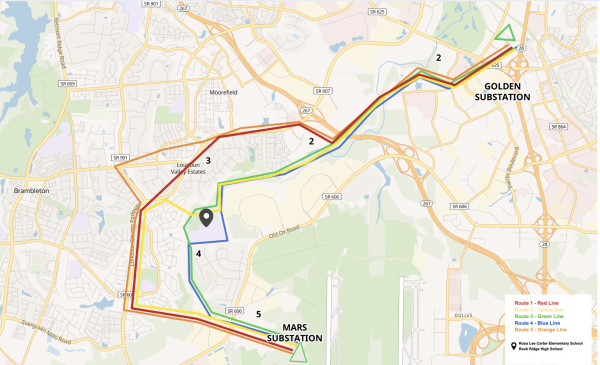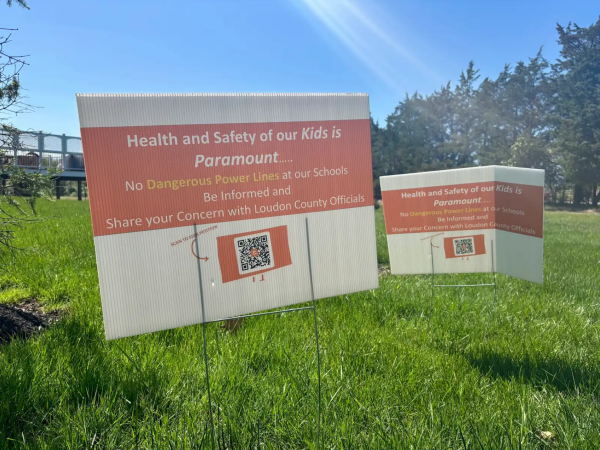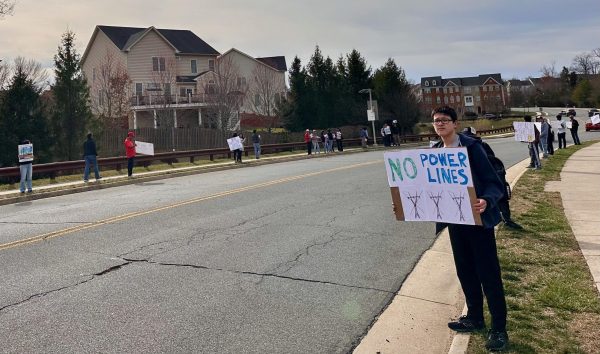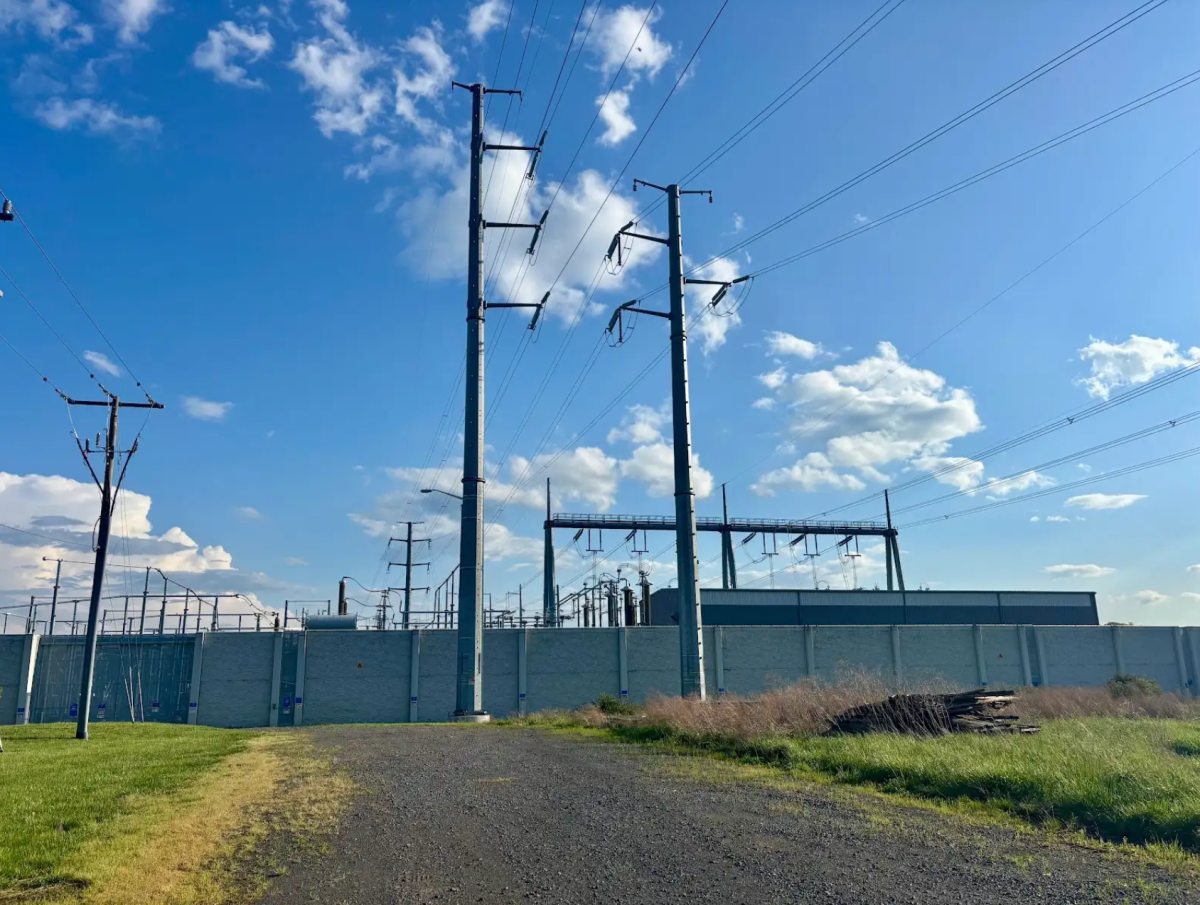For the past two months, a charged debate has electrified the Loudoun Valley community in Ashburn. Local residents have organized protests and started initiatives to fight back against the threat of high voltage power lines that were planned to run near the campus of Rock Ridge High School.
In June 2024, Dominion Energy proposed the Golden-Mars 500-230 kV Electric Transmission Project to connect the Golden and Mars substations in Ashburn. This transmission project has been proposed to bring bulk energy into Ashburn to provide for the rapidly growing tech sector of Loudoun County. It’s also meant to connect two previous projects by Dominion Energy – Wishing Star to Mars and Aspen to Golden – and complete a transmission loop through the data centers. A project intended to support Loudoun County’s growing need for energy and provide reliability to customers has now sparked controversy among Loudoun County residents.
Following approval from the regional grid organization (PJM), Dominion Energy proposed five overground power line route options with the intention of minimizing impacts on residents and the environment after considering various constraints near the Dulles Airport from the FAA, the National Oceanic and Atmospheric Administration (NOAA) weather radar, and county owned property.

Kristian Bryant via MapHub, information from Dominion Energy
However, the decision on which transmission line routes should be opposed or approved has led to backlash from the Loudoun County community, with affected residents advocating and taking initiative to stop the power lines from being built.
In January 2025, The Loudoun County Board of Supervisors endorsed Route Four, the blue line, as its first choice. This route crosses the eastern boundary of Rosa Lee Carter Elementary School and Rock Ridge High School and is parallel to an access road that is on Loudoun County Public School property. The board’s second choice is route three, also known as the green line, which crosses the northern portion of Rosa Lee Carter Elementary School and Rock Ridge High School, and will be south of the homes of Loudoun Valley Estates. Other routes include the orange route, which would go along Loudoun County Parkway and affect corresponding residential homes.
Residents Fight Back
In opposition to the green and blue routes being proposed and supported to be built on school property, some students at Rock Ridge High School have taken matters into their own hands to advocate for their safety. Along with a few other students, sophomore Joshua Weber, a resident of Loudoun Valley Estates II for the past seven years, created the Students Against High Voltage Expansion (SAHVE) initiative to oppose the construction of all five routes of Dominion’s power lines.
“The reason this is a concern for us is because we walk right along where these power lines would be built to and from school, so especially for us walkers, we’re going to be outside, exposed to these power lines,” Weber said.

Acknowledging these concerns, Dominion Energy insists that there isn’t any sort of negative health outcome associated with exposure to power lines while walking to school. “What the students are talking about is acute exposure, while you’re walking to school for a couple of minutes or a couple hours,” Dominion Energy EMF expert and staff engineer Thomas Probst said. “So, that’s outside of the study, that there’s any sort of negative health outcomes associated with that. We site and design our transmission lines as much as it is practicable to limit the magnetic field exposure caused by our transmission lines.”
Weber has dedicated his time compiling research from various health organizations, including the National Institutes of Health (NIH), to argue that there are serious health effects of power lines, including cancer, that will disrupt surrounding communities. In addition to the potential health hazards, he feels that the nature and well-being of his community will be disrupted, with walking, biking, and hiking paths being affected. “ I think that the wooded areas and the nature around our school make our school feel like a safe, welcoming place to learn,” Weber said. “The power lines would disrupt that environment.”
Weber spoke at the school board meeting on March 25, and his team created an Instagram page to spread awareness, participated in protests, and pushed other residents to help take action.“ We saw the need for students to get involved because we believe that as students, our voices are powerful, especially to the school board, and there are many of us,” Weber said.
Other residents of the community joined the efforts by creating a petition with 621 signatures to oppose routes three and four and protect the safety of students attending school. Both the petition and SAHVE efforts spread across the community and pushed residents to email school board members to oppose any overhead power lines close to the school.
Resident efforts were successful at the school board meeting on March 25, in which school board members voted eight to one to oppose overhead transmission lines on school property and support underground options instead. This means that Dominion Energy no longer has jurisdiction to build power lines across Rosa Lee Carter Elementary and Rock Ridge High School.
However, Dominion Energy still believes that the power lines should be built on routes three and four near the school. They are continuing to attempt to change the school board’s vote to allow transmission lines on school property. The energy provider believes that fewer homes are affected in those routes, making it the best option. “What we’ve been doing in the last two weeks is working on trying to figure out what other information we can provide to the school board members that might help them better understand this issue and why we think that a route on school property may make more sense than a route on Loudoun County Parkway,” Robert Richardson, the Electric Transmission Communications Consultant at Dominion Energy said.
Around 75 residents spoke at the school board meeting during the public comment session, pushing the meeting to last over seven hours. Many Rock Ridge students and parents spoke up at the meeting, including junior Laya Arun.
Arun feared that the beauty and charm of her neighborhood would be ruined, pushing her to speak up. “These power lines will take away from the community aspect where you have a bunch of homes, a park, a school, and walking trails,” Arun said. “It will ruin the whole view of the community and the aesthetics of it.”
Freshman Leana Paradkar, a resident of Loudoun Valley Estates II has also been an active member of the committee against power lines. She participated in protests outside of the school to fight against power line routes three and four. “The signs that we held up during the protest showed AI-generated images of what the power lines would look like if they were built behind the schools,” Paradkar said. “It is very scary and can open people’s eyes to what’s really happening.”

Photo courtesy of Joshua Weber
Concerned parents of Rock Ridge students have also gotten involved in initiatives. Arun Subramony is the father of two Rock Ridge students and has been leading efforts to protest against all five overground power line routes and is advocating for underground transmission lines instead.
“Given the fact that the Virginia Department of Education has issued guidelines to every county that they shouldn’t commission any new school near high voltage power lines, I am beyond belief that we are even talking about this topic,” Subramony said. The guidelines state that “Location of schools near electric power transmission lines or other environmental hazards should be avoided.”
Subramony has been actively engaged in the protest, educating school board members, making appearances in public forums, and getting the local Virginia senator and political officials involved. He is soon going to meet with the governor of Virginia to bring more attention to this issue.
Arun finds that this conflict is larger than just a county issue. “The decision Loudoun County makes is a consequence beyond Loudoun County, Virginia, and the United States because in the future, when anyone or any utility company is trying to build a powerline near a school, they will code this as a precedent if we allow this to happen,” Subramony said.
In addition to health concerns, Abhijeet Chimurkar, a father of a Rock Ridge student, is worried about property values, a major concern for many residents. “Loudoun Valley Estates II is considered one of the best communities to live in because of the way they have maintained all the checkboxes from different perspectives of the school, living, and environment,” Chimurkar said. “All of that will get impacted, which eventually will impact our pricing of the houses. People who are living here will try to move out, and people who are trying to come here from different zones will think twice.”
Dominion Energy is aware of property value concerns but believes that the power lines are not the root cause. “We totally understand that [residents] often worry about the proximity of the transmission lines, which might impact home values, marketability, and long-term appreciation,” Media and Community Relations Manager of Dominion Energy Aisha Khan said. “There are so many studies on the relationship between transmission lines and property values that have shown varying results, with many factors influencing home prices beyond the presence of power infrastructure. The property values in the fastest growing areas like Loudoun County are largely driven by housing demand rather than the infrastructure replacement.”
Sanvi Challa via Genially, images from Canva
Health Hazards
Health concerns of the electromagnetic fields from the 500 kV high voltage power lines causing childhood leukemia and other types of cancer have stirred major anxiety and unrest among Loudoun County residents.
Sophomore Bhavitha Doma is just one of the many students who believe that their safety is being compromised, and she will not be staying around to face the health risks if these power lines are built. “My family and I will be packing our stuff and leaving if Dominion Energy builds the blue or the green routes around my neighborhood because it wouldn’t be safe for us to live here anymore,” Doma said.
In response to the ongoing panic about the health risks that are possibly associated with the high-voltage power lines, Dominion Energy has been assuring residents that EMF from nearby power lines is not unsafe. According to Khan, their company has conducted several research studies to further ensure there are no underlying health issues that are connected to this transmission project.
“We take safety very seriously, and it’s our most important core value,” Khan said. “We have experts who regularly review EMF research from state, federal, international health, and scientific agencies. None of the scientific and health agencies that conducted a scientifically valid review of the relevant research on this topic have concluded that magnetic fields cause childhood leukemia or other cancers.”
In addition, Dominion Energy provides information and results of regular EMF research to the Virginia State Corporation Commission for approval of its power lines. “We certainly understand that if you’re sending your kid to a school and think there’s something that’s going to cause cancer, of course, you get concerned and upset about it,” Richardson said. “But what I want the public to understand is that we have 6000 miles of electric transmission lines, and we are not going to build something that is not safe for the public to be around.”
However, leading researchers have reached different conclusions regarding the health effects of EMFs. David O. Carpenter, a public health physician and an environmental health sciences professor at the University of Albany, has found cause for concern. He had previously administered a $5,000 program to determine whether there were adverse health effects of high-voltage power lines.
After many years of research, Carpenter does believe that magnetic field exposure causes a risk for cancer in children. “The utilities certainly don’t want their product to be rated as being cancer-causing,” Carpenter said. “However, the evidence is pretty strong that, especially for young children who are exposed to electromagnetic fields from power lines in the street, there’s an elevated risk of leukemia.”
Carpenter has found that exposure to EMF increases the risk of childhood Leukemia from one in 10,000 to 2-4 out of 10,000. “That doesn’t sound like it’s huge, but if you were one of the children who develops leukemia, it’s not insignificant,” Carpenter said.
Carpenter believes that one of the most troubling aspects is the lack of regulation despite the numerous research studies. “The utilities basically have a free range to build wherever they want, and the people that live near the powerlines have almost no ability to block them,” Carpenter said. “My recommendation would be to route the power line in areas that are not near residents and certainly not through urban areas. There is a hazard associated with it, and everything that can be done should be done to protect people’s health.”
Despite his efforts, Dominion Energy does not find Dr. Carpenter’s claims to be valid. “Nothing in the information Dr. Carpenter provided differs from the opinions he provided to the numerous courts and public utility commissions: such opinions have been rejected regularly or given little to no weight due to their lack of scientific support,” Khan said.
In fact, Dominion believes that their EMF expertise should be trusted instead as shown by a recent case. “The VA SCC Hearing Examiner relied on [Dominion Energy expert] Dr. Mezei’s testimony to conclude that the proposed transmission line at issue in that case did not represent a hazard to public health or safety,” Khan said.
Underground Feasibility
In efforts to stop Dominion Energy from building overground lines in Loudoun County, many people have fought for underground options as an alternative to maintain safety and not interfere with students and residents who live in the affected communities.
Dominion Energy has acknowledged that the public has been fighting for and seeking underground options, but Dominion Energy has expressed to residents, the Board of Supervisors, and elected officials that it’s just not feasible, despite the School Board’s ruling. They have studied 11 potential underground routes over a 12 month period and have also posted feasibility reports explaining the challenges of underground routing.
“The challenges include extensive existing development like underground water and sewer lines and the presence of hard, shallow rock, which makes construction extremely difficult,” Khan said. “There are also restrictions related to airport operations and federally owned land. Another major challenge we identified is finding an area to build transition stations. Transition stations are needed when placing power lines underground and require as much as seven to nine acres of land.”
Richardson further emphasized the impossibility of underground transmission lines by pointing out that only one 500 kV transmission line was built underground in the entire North America – in California. “When you get higher voltages, that’s where you have challenges placing transmission lines underground, and it gets very difficult, it gets time-consuming, and it gets very expensive,” Khan said.
Next Steps
Kristian Bryant via Genially, information from Dominion Energy
Dominion Energy has submitted its application to the Virginia State Corporation Commission (SCC), the state-level regulatory authority overseeing electric transmission projects in Virginia, to receive a Certificate of Public Convenience and Necessity (CPCN). The SCC will get to decide which routes Dominion Energy can build.
Once they hear back from the SCC, Dominion Energy will start the permitting phase, study the wetlands and environmental impacts, and work with people who may own the land and negotiate easements to reserve use of the property. They are hoping to start construction between June and September of 2026 and finish in June of 2028.
Amidst the pushback from Loudoun County residents, Dominion Energy acknowledges that the Golden to Mars project is not an easy one. “We have to balance the environment, residents, school board property, county property, cultural resources, and historic resources with the need to connect these two substations,” Richardson said. “In the area where you all live, there’s just this unprecedented growth of an industry that needs a lot of energy. We are really doing everything we can to also serve every customer, not just residents, not just the schools or the churches or the seven eleven, but also the data centers and the hospitals and the police stations.”
Dominion Energy encourages residents to reach out with questions and concerns through geovoice, where they can also view the map of power lines and see what the land will look like with the power lines. Other ways of contact include sending an email to [email protected] or calling 888-291-0190.
While waiting for the response from the SCC, the efforts of residents to oppose the power lines have not stopped. “ We still have a long fight ahead, but we’re not gonna stop until we make sure that these power lines are either undergrounded or not built at all so that we can protect the students and the residents of our neighborhood,” Weber said.
“We don’t have to agree on everything, but we can agree that our children are precious – they are the future citizens of the world, and we cannot afford to make bad decisions here that we will regret later, ” Subramony said. “ I’m requesting every child who is part of these schools in Loudoun County to take up the fight and write individual letters, posters, tweets, Instagrams, TikTok, or whatever you can, and it’ll have the desired effect.”


























![The Phoenix varsity volleyball team lines up for the national anthem. “We were more communicative [with each other] during this game, and I feel like we kept our energy up, especially after the first set,” senior Jessica Valdov said.](https://theblazerrhs.com/wp-content/uploads/2024/10/DSC_0202-1200x800.jpg)










![Junior Alex Alkhal pitches the ball. “[I] just let it go and keep practicing so we can focus on our goal for the next game to get better as a team,” Alkhal said.](https://theblazerrhs.com/wp-content/uploads/2025/05/DSC_0013-1-1200x929.jpg)


























